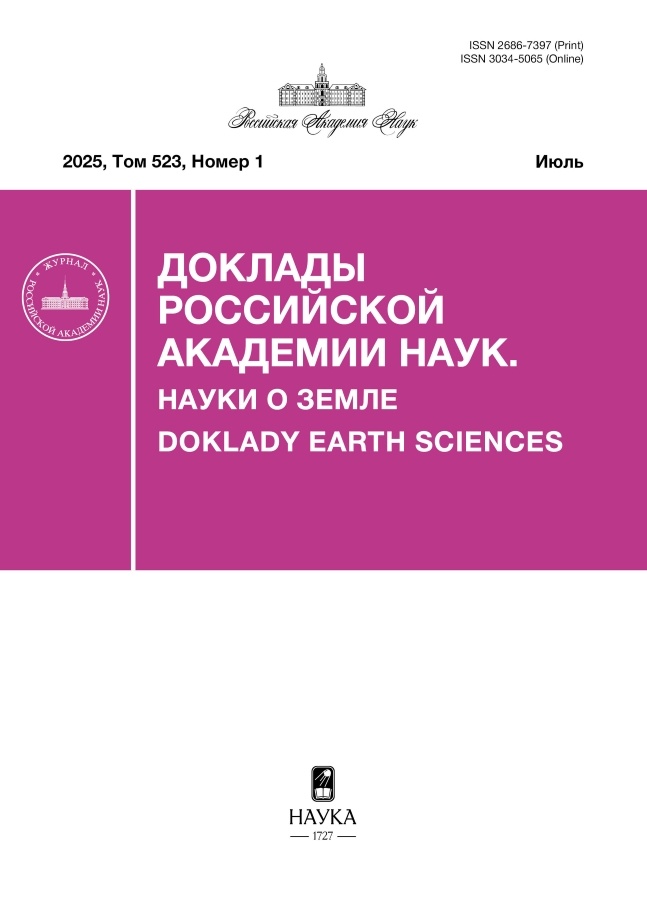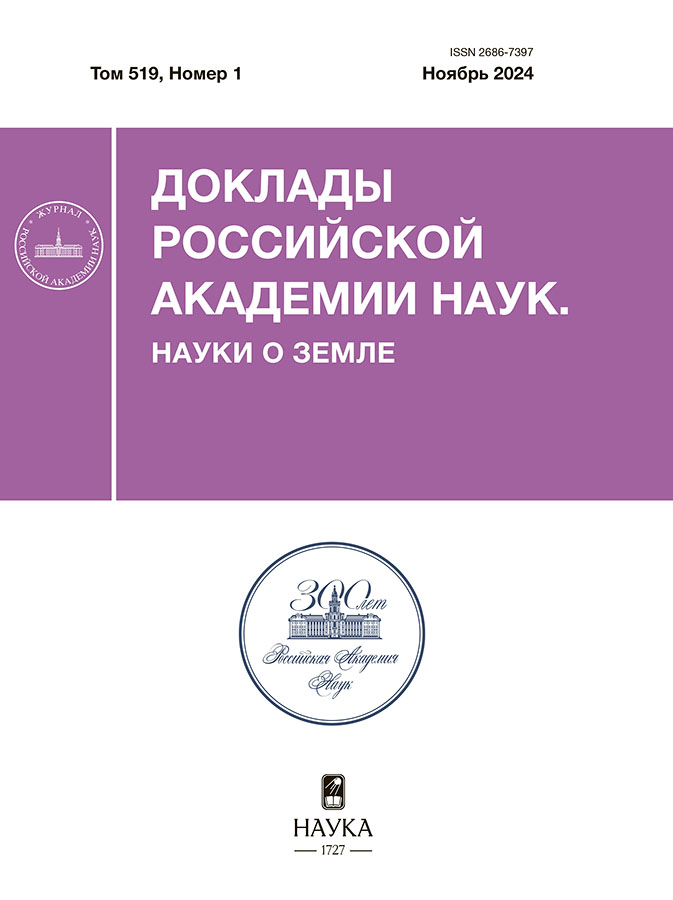Ассимиляция карбонатов базитовыми магмами: фассаитовые габбро ольхонского террейна (западное прибайкалье)
- Авторы: Скляров Е.В.1, Лавренчук А.В.2,3, Семенова Д.В.2
-
Учреждения:
- Институт земной коры Сибирского отделения Российской Академии наук
- Институт геологии и минералогии Сибирского отделения Российской Академии наук
- Новосибирский государственный университет
- Выпуск: Том 519, № 1 (2024)
- Страницы: 453-463
- Раздел: ПЕТРОЛОГИЯ
- Статья получена: 04.06.2025
- Статья опубликована: 20.12.2024
- URL: https://jdigitaldiagnostics.com/2686-7397/article/view/682431
- DOI: https://doi.org/10.31857/S2686739724110093
- ID: 682431
Цитировать
Полный текст
Аннотация
В статье охарактеризованы специфические габброиды, главным породообразующим минералом которых является фассаит – богатый глинозёмом (до 12 мас. % Al2O3) кальциевый пироксен, типичный для высокотемпературных метасоматических пород. Фассаитовые габбро по геохимическим характеристикам близки к субщелочным монцогаббро устькрестовского комплекса, широко распространённым в пределах Крестовского субтеррейна Ольхонского террейна (Западное Прибайкалье). В то же время они резко отличаются от последних по более высокому содержанию CaO и MgO и пониженному – SiO2 и Al2O3. Фассаитовые габбро слагают несколько небольших массивов в обрамлении Усть-Крестовского массива монцогаббро, не контактируя с последними. Предложена модель образования фассаитовых габбро за счёт ассимиляции карбонатного материала (коровые карбонатные выплавки) субщелочными базитовыми магмами.
Ключевые слова
Полный текст
Об авторах
Е. В. Скляров
Институт земной коры Сибирского отделения Российской Академии наук
Автор, ответственный за переписку.
Email: skl@crust.irk.ru
Член-корреспондент РАН
Россия, ИркутскА. В. Лавренчук
Институт геологии и минералогии Сибирского отделения Российской Академии наук; Новосибирский государственный университет
Email: alavr@igm.nsc.ru
Россия, Новосибирск; Новосибирск
Д. В. Семенова
Институт геологии и минералогии Сибирского отделения Российской Академии наук
Email: skl@crust.irk.ru
Россия, Новосибирск
Список литературы
- Daly R.A. Origin of the alkaline rocks. // Geological Society of America Bulletin. 1910. 21. 87– 118.
- Gaeta M., Di Rocco T., Freda C. Carbonate assimilation in open magmatic systems: The role of melt-bearing skarns and cumulate-forming processes. // J. Petrol. 2009. 50. 361–385.
- Carter L.B., Dasgupta R. Hydrous basalt–limestone interaction at crustal conditions: Implications for generation of ultracalcic melts and outflux of CO2 at volcanic arcs // Earth and Planetary Science Letters. 2015. 427. 202–214
- Carter L.B., Dasgupta R. Effect of melt composition on crustal carbonate assimilation: Implications for the transition from calcite consumption to skarnification and associated CO2 degassing, // Geochem. Geophys. Geosyst. 2016. 17. 3893–3916.
- Barnes C., Prestvik T., Sundvoll, et al. Pervasive assimilation of carbonate and silicate rocks in the Hortavaer igneous complex, north-central Norway // Lithos. 2016. 80. 179‒199.
- Wenzel T., Baumgartner L.P., Brugmann G.E., et al. Partial melting and assimilation of dolomitic xenoliths by mafic magma: the Ioko-Dovyren intrusion (North Baikal Region, Russia) // Journal of Petrology. 2002. 43. 2049‒2074.
- Федоровский В.С., Скляров Е.В. Ольхонский геодинамический полигон (Байкал): аэрокосмические данные высокого разрешения и геологические карты нового поколения // Геодинамика и тектонофизика. 2010. Т. 1. № 4. С. 331‒418.
- Donskaya T.V., Gladkochub D.P., Fedorovsky V.S., et al. Pre-collisional (0.5 Ga) complexes of the Olkhon terrane (Southern Siberia) as an echo of events in the central Asian Orogenic Belt // Gondwana Res. 2017. V. 42. P. 243–263.
- Лавренчук А.В., Скляров Е.В., Изох А.Э., Котов А.Б., Сальникова Е.Б., Федоровский В.С., Мазукабзов А.М. Особенности состава габброидов Крестовской зоны (Ольхонский регион, Западное Прибайкалье) как отражение взаимодействия надсубдукционной литосферной мантии с мантийным плюмом // Геология и геофизика. 2017. Т. 58. № 10. С. 1439‒1458.
- Аэрокосмическая геологическая карта юго-западной части Ольхонского региона (Байкал). Зона Крестовский - Широкая. Ольхонский геодинамический полигон. Скляров Е.В. (отв. ред.), Федоровский В.С. (отв. ред.) Москва. 2012. Изд-во: Группа компаний А1 TIS.
- Spera F.J., Bergman S.C. Carbon dioxide in igneous petrogenesis: I. Aspects of the dissolution of CO2 in silicate liquids // Contributions to Mineralogy and Petrology. 1980. 74. 55– 66.
- Mollo S., Gaeta M., Freda C., et al. Carbonate assimilation in magmas: A reappraisal based on experimental petrology // Lithos. 2010. V. 114. P. 503–514.
- Wyllie P.J., Tuttle O.F. The system CaO-CO2-H2O and the origin of carbonatites // Journal of Petrology. 1960. V. 1. No. 1. P. 1–46.
- Fanelli M.T., Cava N., Wyllie P.J. Calcite and dolomite without portlandite at a new eutectic in CaO–MgO–CO2–H2O with applications to carbonatites / In: Morphology and Phase Equilibria of Minerals, Proceedings of the 13th General Meeting of the International Mineralogical Association, Bulgarian Academy of Science: Sofia. 1986. P. 313–322.
- Lentz D.R. Carbonatite genesis: A reexamination of the role of intrusion-related pneumatolytic skarn processes in limestone melting // Geology. 1999. V. 27. P. 335‒338.
- Скляров Е.В., Лавренчук А.В., Мазукабзов А.М. Дайки мраморов и кальцифиров Ольхонского композитного террейна (Западное Прибайкалье, Россия) // Геодинамика и тектонофизика. 2022.13(5).
- Ярмолюк В.В., Кузьмин М.И., Воронцов А.А. Конвергентные границы западно-тихоокеанского типа и их роль в формировании Центрально-Азиатского складчатого пояса // Геология и геофизика. 2013. Т. 54 (12). С. 1831‒1850.
Дополнительные файлы















